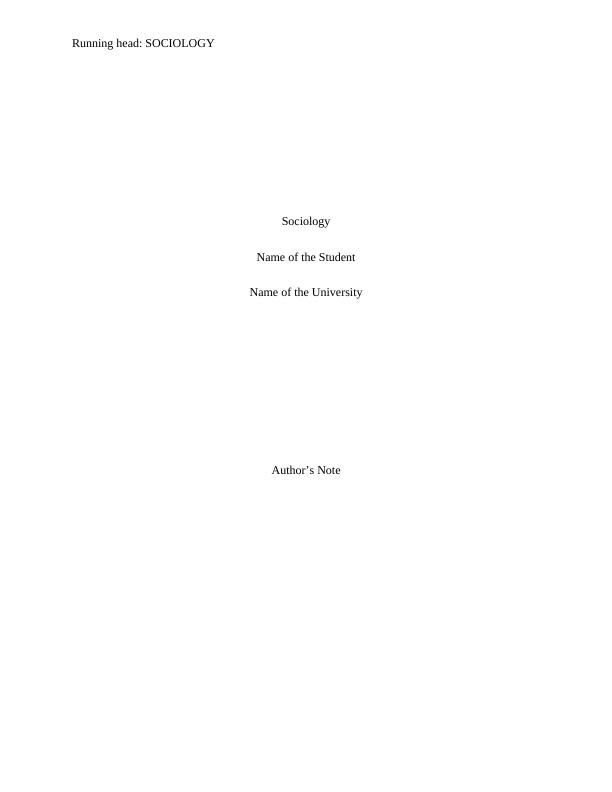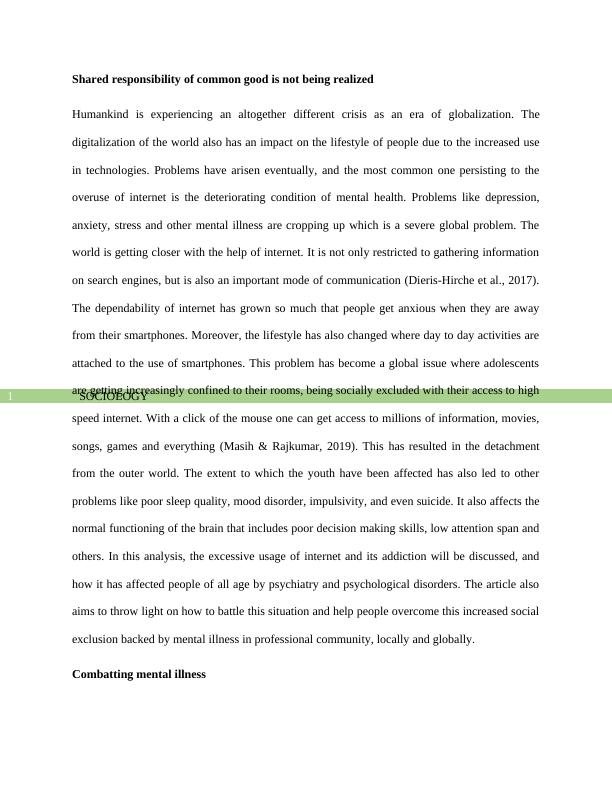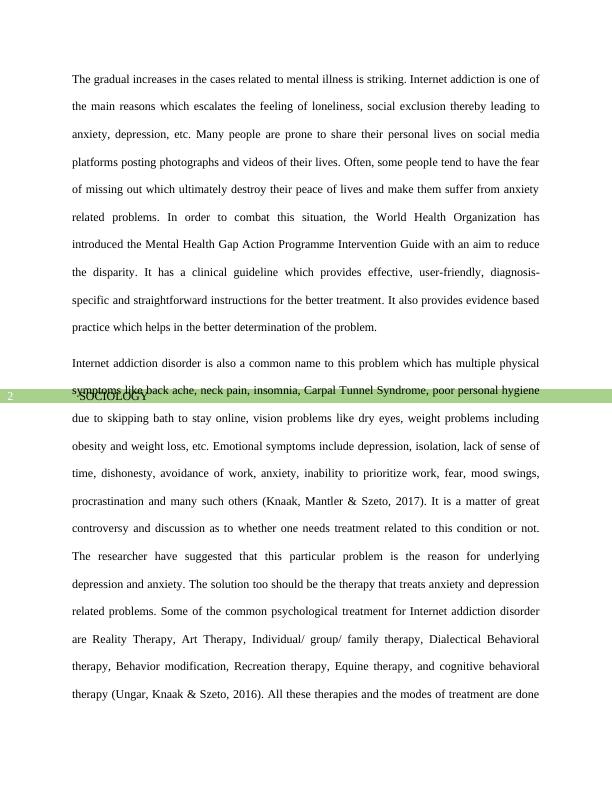Department of Sociology and Anthropology
Added on 2022-08-22
7 Pages1819 Words23 Views
Running head: SOCIOLOGY
Sociology
Name of the Student
Name of the University
Author’s Note
Sociology
Name of the Student
Name of the University
Author’s Note

SOCIOLOGY1
Shared responsibility of common good is not being realized
Humankind is experiencing an altogether different crisis as an era of globalization. The
digitalization of the world also has an impact on the lifestyle of people due to the increased use
in technologies. Problems have arisen eventually, and the most common one persisting to the
overuse of internet is the deteriorating condition of mental health. Problems like depression,
anxiety, stress and other mental illness are cropping up which is a severe global problem. The
world is getting closer with the help of internet. It is not only restricted to gathering information
on search engines, but is also an important mode of communication (Dieris-Hirche et al., 2017).
The dependability of internet has grown so much that people get anxious when they are away
from their smartphones. Moreover, the lifestyle has also changed where day to day activities are
attached to the use of smartphones. This problem has become a global issue where adolescents
are getting increasingly confined to their rooms, being socially excluded with their access to high
speed internet. With a click of the mouse one can get access to millions of information, movies,
songs, games and everything (Masih & Rajkumar, 2019). This has resulted in the detachment
from the outer world. The extent to which the youth have been affected has also led to other
problems like poor sleep quality, mood disorder, impulsivity, and even suicide. It also affects the
normal functioning of the brain that includes poor decision making skills, low attention span and
others. In this analysis, the excessive usage of internet and its addiction will be discussed, and
how it has affected people of all age by psychiatry and psychological disorders. The article also
aims to throw light on how to battle this situation and help people overcome this increased social
exclusion backed by mental illness in professional community, locally and globally.
Combatting mental illness
Shared responsibility of common good is not being realized
Humankind is experiencing an altogether different crisis as an era of globalization. The
digitalization of the world also has an impact on the lifestyle of people due to the increased use
in technologies. Problems have arisen eventually, and the most common one persisting to the
overuse of internet is the deteriorating condition of mental health. Problems like depression,
anxiety, stress and other mental illness are cropping up which is a severe global problem. The
world is getting closer with the help of internet. It is not only restricted to gathering information
on search engines, but is also an important mode of communication (Dieris-Hirche et al., 2017).
The dependability of internet has grown so much that people get anxious when they are away
from their smartphones. Moreover, the lifestyle has also changed where day to day activities are
attached to the use of smartphones. This problem has become a global issue where adolescents
are getting increasingly confined to their rooms, being socially excluded with their access to high
speed internet. With a click of the mouse one can get access to millions of information, movies,
songs, games and everything (Masih & Rajkumar, 2019). This has resulted in the detachment
from the outer world. The extent to which the youth have been affected has also led to other
problems like poor sleep quality, mood disorder, impulsivity, and even suicide. It also affects the
normal functioning of the brain that includes poor decision making skills, low attention span and
others. In this analysis, the excessive usage of internet and its addiction will be discussed, and
how it has affected people of all age by psychiatry and psychological disorders. The article also
aims to throw light on how to battle this situation and help people overcome this increased social
exclusion backed by mental illness in professional community, locally and globally.
Combatting mental illness

SOCIOLOGY2
The gradual increases in the cases related to mental illness is striking. Internet addiction is one of
the main reasons which escalates the feeling of loneliness, social exclusion thereby leading to
anxiety, depression, etc. Many people are prone to share their personal lives on social media
platforms posting photographs and videos of their lives. Often, some people tend to have the fear
of missing out which ultimately destroy their peace of lives and make them suffer from anxiety
related problems. In order to combat this situation, the World Health Organization has
introduced the Mental Health Gap Action Programme Intervention Guide with an aim to reduce
the disparity. It has a clinical guideline which provides effective, user-friendly, diagnosis-
specific and straightforward instructions for the better treatment. It also provides evidence based
practice which helps in the better determination of the problem.
Internet addiction disorder is also a common name to this problem which has multiple physical
symptoms like back ache, neck pain, insomnia, Carpal Tunnel Syndrome, poor personal hygiene
due to skipping bath to stay online, vision problems like dry eyes, weight problems including
obesity and weight loss, etc. Emotional symptoms include depression, isolation, lack of sense of
time, dishonesty, avoidance of work, anxiety, inability to prioritize work, fear, mood swings,
procrastination and many such others (Knaak, Mantler & Szeto, 2017). It is a matter of great
controversy and discussion as to whether one needs treatment related to this condition or not.
The researcher have suggested that this particular problem is the reason for underlying
depression and anxiety. The solution too should be the therapy that treats anxiety and depression
related problems. Some of the common psychological treatment for Internet addiction disorder
are Reality Therapy, Art Therapy, Individual/ group/ family therapy, Dialectical Behavioral
therapy, Behavior modification, Recreation therapy, Equine therapy, and cognitive behavioral
therapy (Ungar, Knaak & Szeto, 2016). All these therapies and the modes of treatment are done
The gradual increases in the cases related to mental illness is striking. Internet addiction is one of
the main reasons which escalates the feeling of loneliness, social exclusion thereby leading to
anxiety, depression, etc. Many people are prone to share their personal lives on social media
platforms posting photographs and videos of their lives. Often, some people tend to have the fear
of missing out which ultimately destroy their peace of lives and make them suffer from anxiety
related problems. In order to combat this situation, the World Health Organization has
introduced the Mental Health Gap Action Programme Intervention Guide with an aim to reduce
the disparity. It has a clinical guideline which provides effective, user-friendly, diagnosis-
specific and straightforward instructions for the better treatment. It also provides evidence based
practice which helps in the better determination of the problem.
Internet addiction disorder is also a common name to this problem which has multiple physical
symptoms like back ache, neck pain, insomnia, Carpal Tunnel Syndrome, poor personal hygiene
due to skipping bath to stay online, vision problems like dry eyes, weight problems including
obesity and weight loss, etc. Emotional symptoms include depression, isolation, lack of sense of
time, dishonesty, avoidance of work, anxiety, inability to prioritize work, fear, mood swings,
procrastination and many such others (Knaak, Mantler & Szeto, 2017). It is a matter of great
controversy and discussion as to whether one needs treatment related to this condition or not.
The researcher have suggested that this particular problem is the reason for underlying
depression and anxiety. The solution too should be the therapy that treats anxiety and depression
related problems. Some of the common psychological treatment for Internet addiction disorder
are Reality Therapy, Art Therapy, Individual/ group/ family therapy, Dialectical Behavioral
therapy, Behavior modification, Recreation therapy, Equine therapy, and cognitive behavioral
therapy (Ungar, Knaak & Szeto, 2016). All these therapies and the modes of treatment are done

End of preview
Want to access all the pages? Upload your documents or become a member.
Related Documents
The Role of Antidepressants in Increasing the Number of Mentally Ill Patientslg...
|8
|1753
|232
Internet Addiction: Symptoms, Consequences, and Suggestionslg...
|8
|1040
|71
Social Media Use and Adolescent Health: The Problem of Depressionlg...
|4
|502
|322
Explaining Pattern of Women’s Mental Healthlg...
|8
|2217
|208
Healthcare Technology Solutions & Services -lg...
|6
|966
|9
[pdf] Defining mental health and mental illnesslg...
|8
|1910
|160
